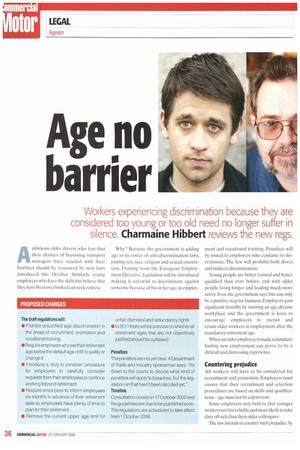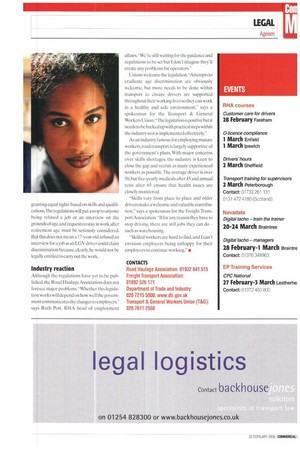Age no barrier
Page 36

Page 37

If you've noticed an error in this article please click here to report it so we can fix it.
Workers experiencing discrimination because they are considered too young or too old need no longer suffer in
silence. Charmaine Hibbert reviews the new regs.
Ambitious older drivers who fear that their chances of becoming transport managers have receded with their hairlines should be reassured by new laws introduced this October. Similarly, young employees who have the skills but believe that they have been overlooked can seek redress. Why? Because the government is adding age to its roster of anti-discrimination laws. joining sex. race, religion and sexual orientation. Flowing from the European Employment Directive, legislation will be introduced making it unlawful to discriminate against someone because of his or her agc, in employ ment and vocational training. Penalties will be issued to employers who continue to discriminate. The law will prohibit both direct and indirect discrimination.
Young people are better trained and better qualified than ever before, and with older people living longer and leading much more active lives, the government says this can only be a positive step for business. Employers gain significant benefits by running an age-diverse workplace and the government is keen to encourage employers to recruit and retain older workers in employment after the mandatory retirement age.
When an olderemplovee is made redundant. finding new employment can prove to be a difficult and distressing experience.
Countering prejudice
All workers will have to be considered for recruitment and promotion. Employers must ensure that their recruitment and selection procedures are based on skills and qualifications -age must not be a deterrent.
Some employers may believe that younger workers are less reliable and more likely to take days off sick than their older colleagues.
The law intends to counter such prejudice by granting equal rights based on skills and qualifications.The regulations will put a stop to anyone being refused a job or an interview on the grounds of age,and requests to stay in work after retirement age must he seriously considered. But this does not mean a 17-year-old refused an interview for a job as an LGV driver could claim discrimination because. clearly, he would not be legallyentitled to carry out the work.
Industry reaction Although the regulations have yet to be published. the Road Haulage Association does not foresee major prohlems."Whether this legislation works will depend on how well the government communicates the changes to em ployers." says Ruth Pott, RHA head of' employment affairs.-We're still waiting for the guidance and regulations to be set but 1 don't imagine they'll create any problems for operators."
Unions welcome the legislation.-Attempts to eradicate age discrimination are obviously welcome, but more needs to be done within transport to ensure drivers are supported throughout their working lives so they can work in a healthy and safe environment," says a spokesman for the Transport & General Workers Union:"Tbe legislation is positive hut it needs to be backed up with practical steps within the industry so it is implemented effectively."
As an industry famous for employing mature workers, road transport is largely supportive of the government's plans. With major concerns over skills shortages. the industry is keen to close the gap and recruit as many experienced workers as possible.The average driver is over 50„but five-yearly medicals after 45 and annual tests after 65 ensure that health issues are closely monitored.
"Skills vary from place to place and older drivers make a welcome and valuable contribution." says a spokesman for the Freight Transport Association.If for any reason they have to stop driving, there are still jobs they can do such as warehousing.
"Skilled workers are hard to find, and !can't envision employers being unhappy for their employees to continue working." • CONTACTS Road Haulage Association: 01932 841 515 Freight Transport Association: 01892 526 171 Department of Trade and Industry: 020 7215 5000: www.dli.gov.uk Transport & General Workers Union (T&G): 020 7611 2550




























































































































































































